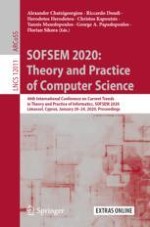2020 | OriginalPaper | Buchkapitel
The Maximum Equality-Free String Factorization Problem: Gaps vs. No Gaps
verfasst von : Radu Stefan Mincu, Alexandru Popa
Erschienen in: SOFSEM 2020: Theory and Practice of Computer Science
Aktivieren Sie unsere intelligente Suche, um passende Fachinhalte oder Patente zu finden.
Wählen Sie Textabschnitte aus um mit Künstlicher Intelligenz passenden Patente zu finden. powered by
Markieren Sie Textabschnitte, um KI-gestützt weitere passende Inhalte zu finden. powered by
